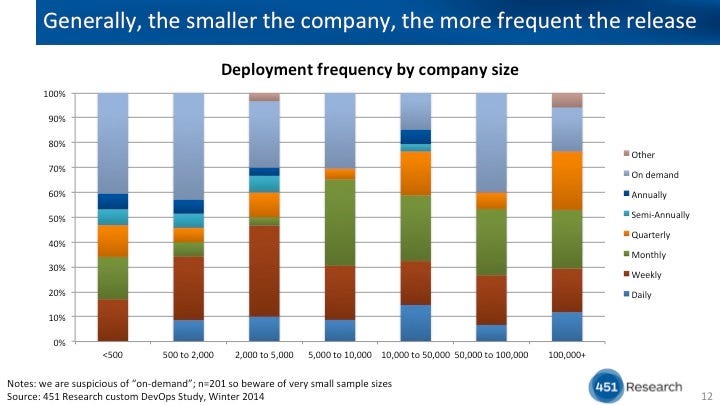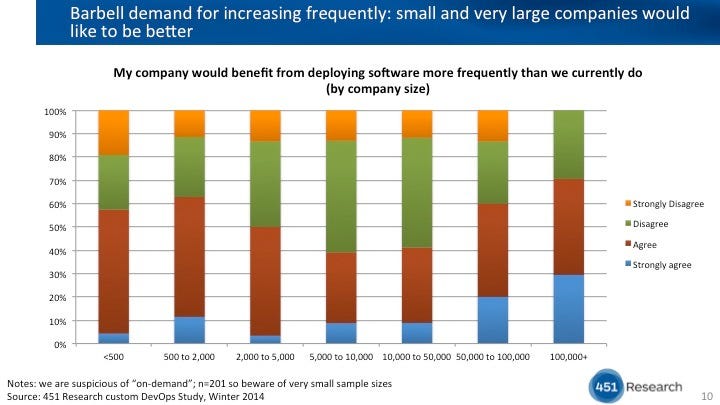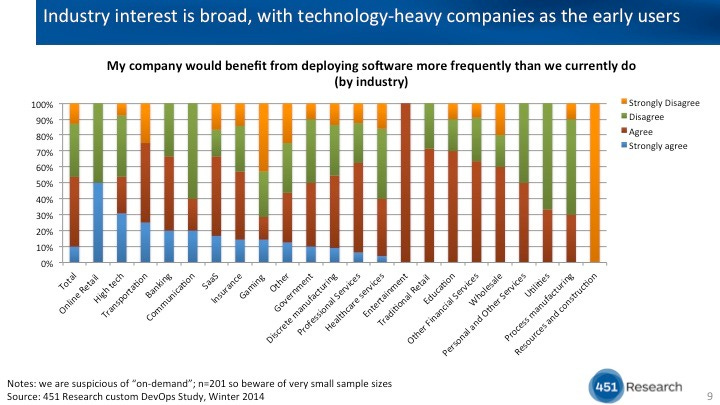[Coté Memo #7] Who wants to do DevOps, "The Death of AWS" headlines, Boyhood
Meta-data
Hello again, welcome to #7. Today we have 21 subscribers, so we're +1 again. I'd love to hear what you like, dislike, your feedback, etc.: memo@cote.io.
See past newsletters in the archives, and, as always, see things as they come at Cote.io and @cote.
Sponsor
451 Research, is having it's big cloud conferences this Fall, Oct. 6th to 8th. I'll have a session or two on developer relations and marketing, and other analysts will be talking about their area. Anyhow, if you're interested, I have a discount code you can use: go to the registration page, and enter the code MC200 to get $200 off the registration price.
Tech & Work World
Who wants to do DevOps?
This past Q1 and Q2 we did a DevOps study at 451. You can read a sort of ribald summary in my infrequent The Register column, and my DevOps talks for overviews of the study and other findings. (Why haven't I done an official 451 report?, you ask: good question. I should do that).
I field a lot of consultative questions about DevOps and frequently refer to this study. It has it's problems for sure: it's a phone-based survey of 201 people, so the same set it small. Compare that the 2014 Puppet Labs DevOps study with 9,000 people, though web-based.
One question we're asked frequently asked is the break-out by industry and company size.
I chose two questions to "cross-tab" on by industry and company size:
how frequently do you deploy applications to productions?
would you benefit from deploying more frequently?
I chose these questions because the study uses this benefit (deploying to production frequently) as one of the chief goals of DevOps. Indeed, as I've watched vendors try out different value propositions and approaches to selling DevOps, I've noticed that most of them settled on this.
See the resulting charts below or on my blog:
The results, when I squint at those charts, are essentially:
Desire is a barbell: small and very large companies have the most desire to release more frequently.
We could go faster, but let's not kill ourselves trying: most folks, by industry type, are not fanatical ("Strongly agree") about increasing deployment frequency. Online retail is; it's interesting to see banking rank so high.
Smaller companies release more frequently, larger like monthly more than weekly: monthly and weekly are popular release frequency periods, with an interesting switch over to mostly monthly happening north of 5,000+ people companies. I suspect it's hard for those companies to move much faster with all the process and people involved. Companies smaller than 500 like monthly releases (vs. daily) as well.
Some caveats, or "notes" as we like to say in the biz:
This is a very small sample size of 201, so don't get too excited about precision.
I'd throw out the "on-demand" answers. We did a poor job with that answer and I'm suspicious of it since it's so large across the board
What are y'all seeing?
Real-time follow-up: The Director of DevOps had some suggested follow-up reading.
"The Fall of AWS" headlines abound
(These are from last week, but I done caught up!)
Having reported a slight revenue dip this past quarter, AWS is getting the funeral headline treatment. Some of the better stories are Barb Darrow's which rounds up some Dropbox usage rumors who sums up the numbers this:
Amazon announced Thursday that for its second quarter, which ended June 30, the category that includes AWS saw a 3 percent sequential revenue slip. That “other” category — which also includes advertising services and co-branded credit card agreements — also logged 38 percent growth year over year. That sounds great until you realize year-over-year growth in the first quarter was 60 percent. There have been other slight quarterly dips in the category’s otherwise relentless rise over the past few years, but they’ve mostly happened between fourth and first quarters.
And, of course, Jack Clark at The Register (soon to be with Bloomberg) which has this:
Where this gets tricky for Amazon is that the margins from reselling computers and storage are likely far higher than those it extracts from its traditional retail operations.
This means that AWS is one of the divisions that Bezos can use to create profits for his company, should Wall Street demand it.
Fun & IRL
Boyhood
I saw the movie Boyhood this past weekend. If you have kids, you'll like this movie. If you don't have kids, you'll only like the last minute of it.





